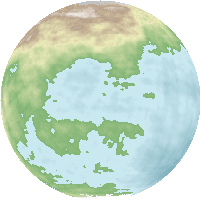Sungatl
| Sungatl (XS-25-33) | |
|---|---|
 | |
| Planet | |
| Designation | XS-25-33 Sungatl |
| Pronunciation | Native: [ˈsuŋ.ɡatɬ] English: /ˈsuŋ.ɡɑ.təl/ |
| Classification | Dwarf planet Devoid of intelligent life (before 2121) Human-inhabited planet (2121–present) |
| Location | Gliese 667 star system, orbiting Gliese 667C |
| Discovered | 2105 |
| Colonized | 2121 |
| Diameter | approx. 2,300 km |
| Government | |
| Government | Federation of Sungatl Fascist totalitarian dicatorship |
| Capital | Kenon |
| Founded | 2944 |
| Demographics | |
| Language | Boesjim |
| Demonym | Boesjina |
| Population in CE 3000 | 999,000,000 |
| Created by | joan-lambert |
Sungatl (Boesjim pronunciation: [ˈsuŋ.ɡatɬ]), formerly designated as XS-25-33, is a human-inhabited dwarf planet-state located in the Gliese 667 star system approximately 23 lightyears from Earth. Sungatl began as an experimental colony which was monitored from Earth in secret for the first century of its inhabitance. Inhabitants of the planet speak Boesjim, a native language with no relatives on Earth, and are known as Boesjina. Sungatl society is now fairly technologically advanced, though interstellar space travel is not possible without the use of Earth technology. The government, the Federation of Sungatl, is a fascist, totalitarian dictatorship which took power officially in 2944, resulting in an ongoing civil war.
History
Discovery and Colonization
- See also: United States Department of Space Colonization (USDSC)
When XS-25-33 was discovered in 2105 by American astrophysicist Janie Richmond, it was declared devoid of intelligent life (DIL) by the United States government. Its atmosphere and natural conditions were expected to be suitable for human life, and it was therefore recommended for the US Department of Space Colonization's controversial READY program, aimed at observing the organic development of human society from afar.
The planet was first colonized by the USDSC in 2121 with plans for surveillance through 2621. In accordance with READY regulations, forty adult colonists were stationed at ten sites across the planet (two male-female couples per site) along with a hundred cryogenically frozen embryos per site, to be unfrozen at regular intervals. Colonists were instructed to set up basic camps and to oversee the thawing and raising of the embryos over a period of fifty years. They were also instructed to reveal as little information as possible about who they were and where they came from and to communicate with newly thawed colonists, known as First Wavers, without any spoken language.
Over the next two centuries, the residents of XS-25-33 were monitored remotely by the USDSC from a covert base on the larger of the planet's two moons, XS-25-33-A. However, contact between this lunar base and Earth was lost during the Yucatán War of 2338. The READY program was completely abandoned by the United States government when the USDSC was disbanded in 2045. Earth humans would not monitor or interact with the residents of XS-25-33 until the year 2896.